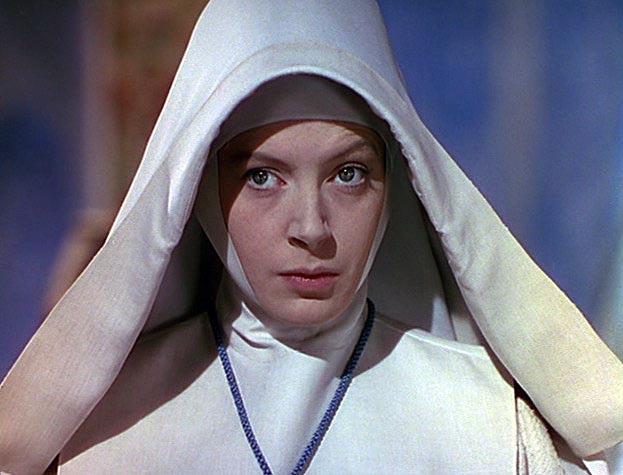by Roger Ebert
She shared a passionate kiss with Burt Lancaster as the surf rolled over them in “From Here to Eternity.” She was “I” in “The King and I.” She crawled through the mud with a Marine played by Robert Mitchum in “Heaven Knows, Mr. Allison.” She was a sheep drover’s wife in “The Sundowners,” a headmaster’s wife in “Tea and Sympathy,” and the wife of Brutus in “Julius Caesar.” She missed an appointment with Cary Grant atop the Empire State Building in “An Affair to Remember.” In three different roles, she represented the colonel’s lifelong romantic obsession in “The Life and Death of Colonel Blimp.” And simply by standing up in “Black Narcissus,” she started the young Martin Scorsese thinking about movies in a new way.
Deborah Kerr, the flame-tressed beauty who was one of the most luminous stars of her time, is dead at 86. A victim of Parkinson’s disease, she died Tuesday in Suffolk, England, where she had moved from her longtime home in Switzerland to be near her daughters and grandchildren.
Ms. Kerr held the record for the most “best actress” Oscar nominations without a win, after getting Academy nods for “Edward, My Son” (1949), “From Here To Eternity” (1953), “The King And I” (1956), “Heaven Knows, Mr. Allison” (1957), “Separate Tables” (1958) and “The Sundowners” (1960). She won an honorary Oscar in 1994, telling the audience, “I’ve never been so frightened in my life, but it’s better now, because I know I am among friends.”
Originally trained as a dancer with the Sadler’s Wells company, she began appearing in British films in 1940, and caught the eye of Michael Powell, the leading British director of the time, who said in his autobiography that he was always in love with her. In his great film “The Life and Death of Colonel Blimp” (1943), she reappears three times in three different characters in the life of the Colonel, who ages from a hero into a figure of fun for younger officers.
Four years later, in Powell’s “Black Narcissus,” she did something that young Martin Scorsese couldn’t figure out. “There was something called the Million Dollar movie on TV when I was a kid,” he told me, “and they played the same movie every day for a week. I watched that one five times. She plays a nun in a convent in the Himalayas, who is told by a British officer that he believes she has sexual feelings. There is a cut to a close-up of her. But not just any close-up. There was a quality of shock and surprise in her face, and another quality I couldn’t pin down. What did she do, and how did she do it? I began to look at movies with a more analytical eye.”
Years later, Scorsese hired Powell, whose films he hugely admired, as a consultant, and he asked him about that shot. “I didn’t simply cut to a closeup,” Powell said. “I had her stand up in shock, from below frame, and then I edited the shot to begin the moment she arrived in frame. So you sensed that alarmed movement.”
Ms. Kerr was married twice, first in 1945 to Anthony Bartley, a war hero. They had two daughters, Melanie and Francesca. After they divorced in 1959, Kerr wed the writer Peter Viertel, whose mother was Greta Garbo’s best friend, and who was said to be the original for the Robert Redford character in “The Way We Were.” Her husband, daughters and three grandchildren survive.
Ms. Kerr was born in Helensburgh, Scotland, on September 30, 1921. Despite her many down-to-earth roles, she was long seen as a proper English beauty, but, The New York Times reported, “instructed friends to tell anyone who asked that she preferred cold roast beef sandwiches and beer to champagne and caviar, any day.”












